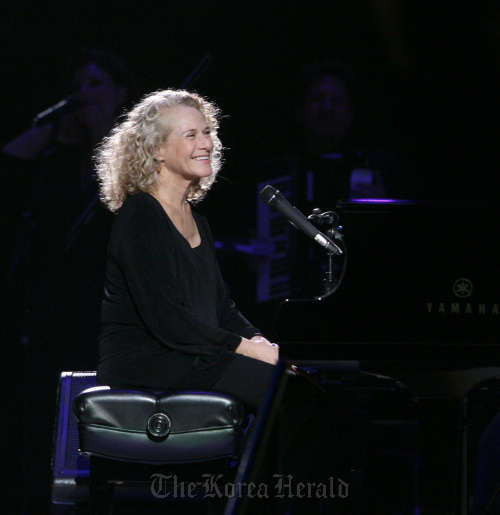NEW YORK (AP) ― The voice behind dozens of standards like “It’s Too Late,’’ `’You’ve Got a Friend’’ and “(You Make Me Feel Like) A Natural Woman’’ says her music-making days are likely over.
Carole King, now a best-selling author, doubts she will ever write another song and suggested that her 2010 “Troubadours Reunion’’ concert tour with James Taylor would be her last: “It was a good way to go out.’’
King composed dozens of 1960s hits with then-husband Gerry Goffin before emerging as a recording artist in her own right. Her 25 million-selling “Tapestry’’ launched the singer-songwriter era in 1971 and became the first real blockbuster album. She spoke recently as two new projects offer fresh reminders of her legacy _ the memoir “A Natural Woman’’ and a new disc that gathers “demo’’ recordings of some of her best-known songs that were made to sell the compositions to other artists.
 |
Carole King performs at the Wachovia Center in Philadelphia, Pennsylvania, on June 10, 2010. (Philadelphia Inquirer/MCT) |
It’s intriguing to hear King’s first take on the songs that became known through others, like “Pleasant Valley Sunday’’ (the Monkees), “Crying in the Rain’’ (Everly Brothers), “Take Good Care of My Baby’’ (Bobby Vee) and “You’ve Got a Friend’’ (James Taylor). The wiser artists didn’t fiddle much with her arrangements.
That’s only a sampling, because King’s pre- “Tapestry’’ hits also included “Up on the Roof’’ (Drifters), “Loco-Motion’’ (Little Eva), “Will You Love Me Tomorrow (Shirelles), “One Fine Day’’ (Chiffons) and “Chains’’ (Cookies, later covered by the Beatles).
She hasn’t released an album of new compositions since 2001, and on her website’s exhaustive list of songs she has written, the most recent are two from 2004.
“At this point I can look back at my life and career as a songwriter and say I’ve done everything I really wanted to do,’’ King said.
She’s not naive. She knows popular culture has long since moved elsewhere. As a teenage music prodigy, she knew what young people were thinking about and wanted to hear in music, and she’s not there anymore.
“I suppose if I had a reason to, if someone said, ‘I want you to write a song for this movie,’ I could sit down and do that,’’ she said. “But to just write songs and to throw them out into the marketplace, I don’t think this is my time to do that.’’
The decision to shut it down or keep creating is one that many members of an older musical generation face. Billy Joel announced in the early 1990s that he was through writing pop songs. But Bob Dylan has kept writing and releasing new music. Both surviving members of the Beatles, Paul McCartney and Ringo Starr, keep turning out new projects. The Beach Boys have an unlikely reunion, with a new album as well.
Neil Sedaka, who grew up in the same New York City song publishing houses as King, was wistful when told King was no longer writing.
“When you’ve written so many great ones like Carole King, it’s difficult to top yourself,’’ the veteran singer said. “You have to keep reinventing, and she’s certainly one of the great pop writers of the last 50 years. It becomes a great challenge. People really want to hear her in concert doing those wonderful songs that they know.’’
Those chances may be limited, too. King did a fair amount of touring during the past decade, but it took its toll. “I’m 70,’’ she said. “It would be lovely to retire.’’
“The Legendary Demos,’’ a title that embarrasses her, was a project of her daughter and manager, Sherry Kondor.
“I supported it. But I had very little hand in it. I didn’t pick the songs. I saw the cover and said, ‘Yeah, that’s a nice picture,’’ King said.
But it doesn’t engage her nearly as much as the memoir. Learning it had made The New York Times best-sellers list excited King as much as learning that one of her songs was climbing the Billboard charts back in the day.
With her writing frequently interrupted by concert tours and activism (including work for environmental causes and Democratic politicians), the book took King 12 years to write. She was determined to do it herself without a ghost- or co-writer.
The strongest part of the book is also the most shocking. She talks of being physically and verbally abused by her third husband in the 1970s, the man who led her to the Idaho backcountry that she adores and still lives in. Even King found it hard to believe that despite fame, success and plenty of friends, she wouldn’t end the relationship the first time she was hit ― and even several times thereafter. She finally did leave, and he died of a drug overdose shortly after that, according to her book.
“It was very difficult, too complicated to talk about in a small sound bite,’’ she said. “My editor said to just write about it, you don’t have to include it. But I decided to include it because I want other women in abusive relationships to know that it’s not their fault and that it can happen to anyone.’’
With her first book is fresh on the market, she’s already thinking about the possibility of another one.
“Now that I’m 70, I have bits of wisdom I can offer to a younger generation,’’ she said. “It’s not ‘This is the way it has to be,’ but ‘This is my experience, I hope this helps you.’’’







![[Weekender] Korea's traditional sauce culture gains global recognition](http://res.heraldm.com/phpwas/restmb_idxmake.php?idx=644&simg=/content/image/2024/11/21/20241121050153_0.jpg)
